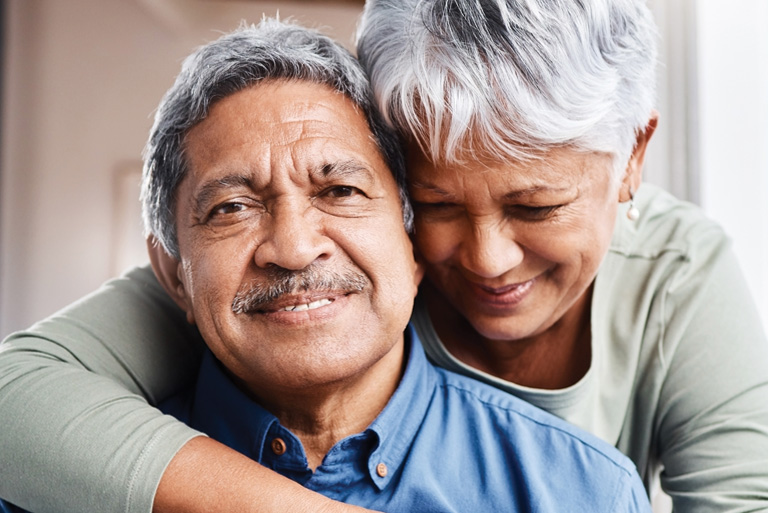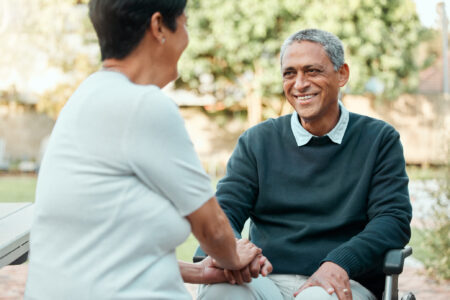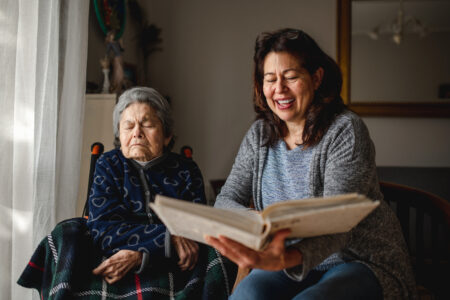
Share On Social!
By 2030, 40% of Alzheimer’s patients in the U.S. will be Latino or Black.
However, Latinos make up less than 1% of participants in National Institutes of Health clinical trials.
Clinical trials are studies that help researchers learn more to help slow, manage, and treat Alzheimer’s and cancer for current and future family members. Without Latino volunteers for clinical trials, the benefits may miss this group.
With Compadre CART at the Biggs Institute for Alzheimer’s & Neurodegenerative Diseases at UT Health San Antonio participants have the opportunity to help an underrepresented, high-risk group maintain independence with aging.
To participate, contact Luis Serranorubio of the research team at 210-450-8447.
Compadre CART Study Goals
To learn more about why dementia is disproportionately affecting Latinos, Biggs Institute researchers are recruiting volunteers. Researchers will evaluate home-based technology to determine how to improve the health and well-being of Latino older adults living at home.
This study will:
- discover real-world physical, cognitive and social activity patterns that promote the risk of and resilience to cognitive decline in older Mexican American adults.
- Evaluate the relationship between engagement in physical activity and neuroimaging indexes of healthy brain aging and dementia. Physical activity is associated with reduced risk of dementia, but there is still a large gap in knowledge regarding how activity affects cognitive health in Mexican Americans.
- Examine the inflammatory profile associated with activity engagement and its relationship with cognitive decline and healthy brain aging.
Findings from this study will be used to help older Latino adults maintain health and independence as they age.
To participate, contact Luis Serranorubio of the research team at 210-450-8447.
Participating in Compadre CART
Participants will:
- Use items such as activity monitoring wristwatches to provide insight about their mobility and sleep.
- Have six clinical visits over 36 months and will have six clinical visits. Some visits can be completed at home. The participant’s first visit will include a review of physical health, thinking, and mood. Staff will also ask questions related to demographics and medical history. The visit will also include a brain Magnetic Resonance Imaging (MRI) scan, unless one has been completed in the past year.
Once a week, participants will complete a 5-minute online behavior and health questionnaire. Participants will also complete a questionnaire on physical and/or social activity.
After the first, second, and third year there will be a three-hour follow-up assessment to review health information and collect blood samples.
To participate, contact Luis Serranorubio of the research team at 210-450-8447.
Compadre CART Study Eligibility
Regarding eligibility, participants must:
- Age 62 or older
- Identify as Mexican American
- No significant mobility issues
- No diagnosis of dementia
- Living alone or with one other adult person
- Have reliable broadband internet connection
- Live in a home or apartment with more than one room
To participate, contact Luis Serranorubio of the research team at 210-450-8447.
Compadre CART Study In-home Assessment System
In-home sensors will be used to help measure physical activity patterns. Study participants will receive a stipend of $20 each month to help offset the cost of Internet service.
The in-home system will be removed at the end of the study or at any point the volunteer wishes to stop participating.
Provided smart technology devices will include:
- A small computer to collect and send the sensor information. The computer will conveniently be out of sight.
- Sensors on exit or entry doors.
- Motion sensors in each room These sensors are unable to record sound or pictures.
- WorkTime software to count time on the computer. This software is unable to view screen content or store information.
- Beiwe application on the participant’s smart phone to measure why and how often the phone is used and the amount of physical activity done when the phone is being carried by the participant.
- Emfit QS sensor on the volunteer’s bed to enhance and validate the sleep data by reading heart and breathing rates, heart rate variability and movement activity, such as tossing and turning.
- Watch-like device to measure physical activity levels both in and outside of the home. This device will also help researchers understand the participant’s activity during the day and night, as the participant will be asked to wear it 24/7.
To participate, contact Luis Serranorubio of the research team at 210-450-8447.
Find Other Clinical Trial Opportunities!
With the rise of dementia in this population, we need more Latino participants in brain health clinical trials.
Dr. Amelie Ramirez, director of Salud America! at UT Health San Antonio, is working to create ways for Latinos to participate in clinical trials thanks to a grant from Genentech, a member of the Roche Group.
Through resources like webinars, social media, and uplifting stories of real Latinos who have participated, you can learn more about the benefits of participating in clinical trials.
Visit the Salud America! clinical trials page to learn more about volunteer opportunities and how you and your familia can participate.
By The Numbers
142
Percent
Expected rise in Latino cancer cases in coming years



